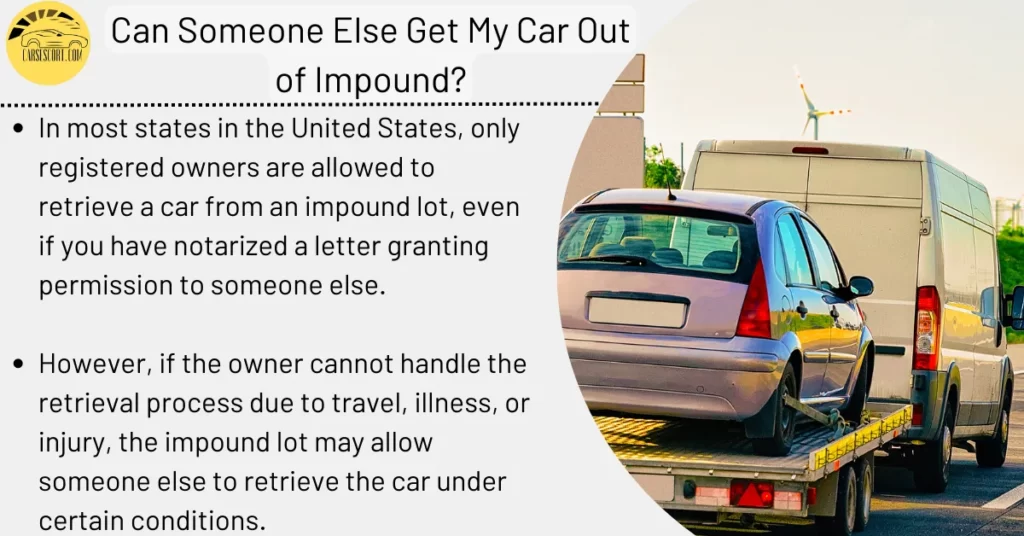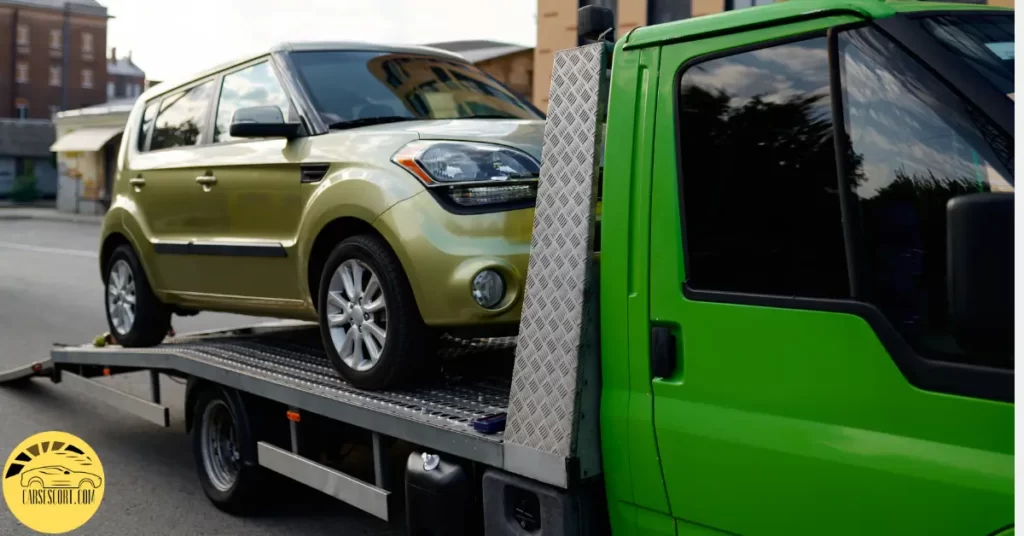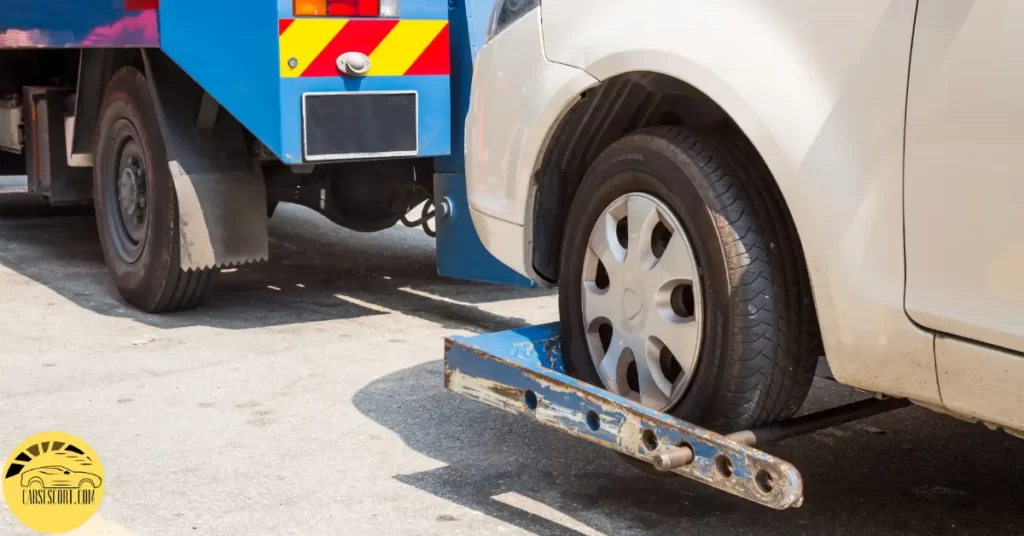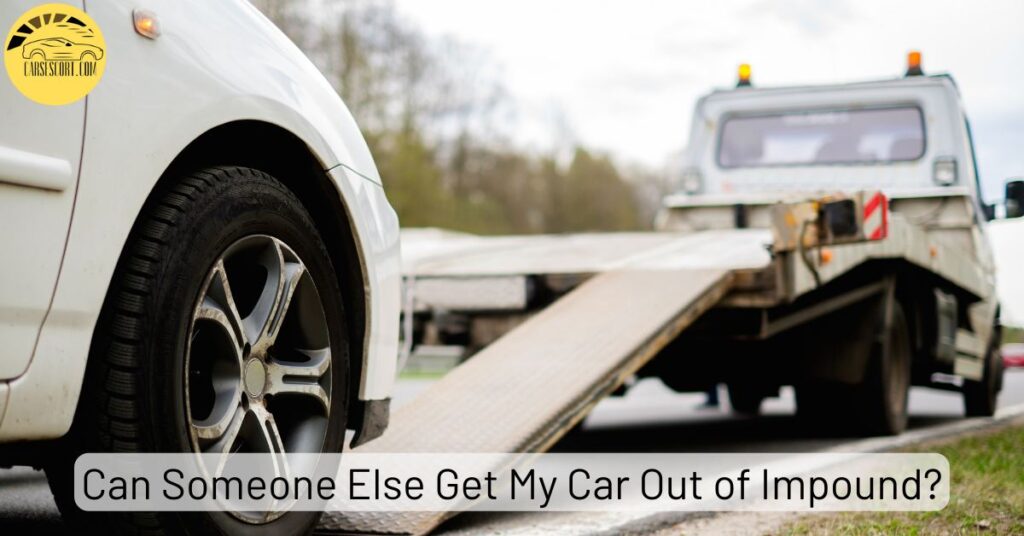Dealing with an impounded vehicle can be a stressful and confusing experience, but understanding the rules and regulations can help you navigate the process more smoothly. But can someone else get my car out of impound?
- In most states in the United States, only registered owners are allowed to retrieve a car from an impound lot, even if you have notarized a letter granting permission to someone else.
- However, there are a few exceptions in certain states. If the owner cannot handle the retrieval process due to travel, illness, or injury, the impound lot may allow someone else to retrieve the car under certain conditions.
- These conditions usually include providing photo identification, a notarized power of attorney, and payment of any fees accrued during the car’s impoundment period.
Documents Required For Non-Registered Owners To Impound A Car
- Proof of owner identity (driver’s license, ID card, or passport)
- Proof of owner relationship to you (if applicable)
- A copy of your written consent or power of attorney document
- Vehicle registration documents or title (to prove ownership)
- Any additional paperwork or fees required by the impound lot
- Title Certificate (If Two Names Are on a Car Title)
Some Common Rules Of Impound Yards
Impound yards, also known as vehicle impound lots or towing yards, are facilities where vehicles are stored after being impounded by authorities or towed for various reasons.
Some standard rules that are typically enforced in impound yards are:
- No unauthorized entry: Impound yards are private property, and unauthorized individuals are generally not allowed to enter without proper permission or a valid reason.
- Valid identification: Individuals seeking access to the towing yard may be required to provide valid identification to prove their identity and relationship to the impounded vehicle.
- Proof of ownership or authorization: If you claim a vehicle from the impound lot, you typically need proof of ownership, such as vehicle registration documents or a title. Alternatively, if the owner authorizes you to retrieve the vehicle, you may need to provide an authorization letter.
- Payment of fees: Towing yards usually charge fees for the towing and storing of vehicles. The owner or authorized person must typically pay all outstanding fees and charges to retrieve an impounded vehicle.
- Operating hours: They may have specific operating hours for vehicle retrieval and other services. It’s essential to check the yard’s schedule and plan your visit accordingly.
- Safety regulations: Towing yards often have safety regulations in place for visitors. These may include wearing appropriate footwear, following designated walkways, and refraining from actions that could endanger oneself or others.
- No tampering with vehicles: Visitors are generally not allowed to tamper with or attempt to start or move vehicles without proper authorization. Tampering with towed vehicles can result in legal consequences.
- Restricted items: Certain items may be prohibited, such as weapons, hazardous materials, or illegal substances. It’s important to comply with any restrictions and follow instructions given by impound yard personnel.
- No loitering: Impound yards are typically not meant for recreational activities or extended stays. Once you have completed your business, you are expected to exit the premises promptly.
- Compliance with the law: Visitors must comply with all applicable laws and regulations. Any illegal activities or behavior will not be tolerated and may lead to legal consequences.
Can Someone Else Get My Car Out of Impound?
Yes, someone else can often retrieve your car from an impound yard, provided they have the necessary authorization, documentation, and power of attorney.
However, specific rules and regulations can vary depending on the state or jurisdiction. While there are common principles, it’s crucial to consult the local laws and impound yard policies for accurate information.

Essential Requirements To Release The Car From Impound To The Non-Registered Owner
1. Ownership Verification
Typically, car impound yards require proof of ownership to release a vehicle. This proof can be in vehicle registration documents, the title, or any other official documentation that establishes you as the rightful owner.
2. Authorizing Someone Else
While the impound lot usually requires the owner’s presence to release a vehicle, it is possible to authorize someone else to retrieve your car under certain circumstances.
In such cases, you’ll need to provide written consent and include specific details such as the authorized person’s full name, contact information, and a statement permitting them to retrieve your vehicle.
To ensure they accept such authorization, it’s crucial to check with the impound lot beforehand.
3. Power of Attorney
In situations where you cannot personally be present to retrieve your impounded car or authorize someone else, obtaining a power of attorney can be a viable solution.
Power of attorney grants someone else the power and authority to act on your behalf. By granting power of attorney to a trusted individual, they can represent you and handle the necessary paperwork at the impound lot, facilitating the release of your vehicle.
4. Required Documentation
When someone else retrieves your impounded vehicle, they must provide specific documentation to ensure a smooth process. These documents typically include the following:
- Proof of their identity
- Proof of relationship
- Power of attorney document
- Vehicle registration documents or title
- Additional paperwork or fees required
Ensuring that all the necessary documents are in order can save time and prevent potential setbacks when retrieving your impounded vehicle.
5. Communication with the Impound Lot
Clear and open communication with the impound lot personals is crucial to having someone else retrieve your car before sending someone to pick up your vehicle.
Contact and inform them about the situation. Provide them with the details of the authorized person or the person with power of attorney and inquire about any additional requirements or procedures that must be followed.
6. Payment and Fees
It’s important to note that impound lots usually charge fees for vehicle storage and other related services. These fees must be paid before the vehicle can be released.
If you authorize someone else to retrieve your car, ensure they have the necessary funds to cover the fees.
Communicate with the impound lot in advance to estimate the total costs involved and inquire about acceptable payment methods.
7. Exceptions and Limitations
While it is generally possible to have someone else get your car out of impound, there may be exceptions and limitations based on local laws and impound lot regulations.
Some jurisdictions might have specific rules regarding retrieving impounded vehicles, so it’s crucial to familiarize yourself with the applicable laws in your area.
Contacting the towing lot and local authorities for clarification can provide you with accurate information regarding any restrictions or special requirements that may apply to your situation.
8. Towing Company Policies
In addition to local regulations, it’s essential to consider the policies and procedures of the specific towing company that impounded your vehicle.
Different towing companies may have varying rules regarding who can retrieve a vehicle.
It’s advisable to contact the towing company directly to inquire about their policies and any additional steps to be followed when authorizing someone else to retrieve your car.
9. Timely Action
Dealing with an impounded vehicle requires prompt action. Most impound lots have daily storage fees, meaning the longer your car remains in impound, the higher the costs will be.
To avoid unnecessary expenses and complications, taking immediate steps to retrieve your vehicle or authorize someone else to do so on your behalf is essential.
Where is My Car Impounded? How To Find?
1) Contact Local Law Enforcement
Start by contacting the non-emergency number of your local police department or the relevant law enforcement agency.
Provide them with your vehicle details, such as the license plate number, make, and model. They can inform you if your car has been impounded and provide the necessary details.
2) Check Local Impound Lots
Inquire about towing lots or vehicle storage facilities in your area. These places are typically operated by towing companies or government agencies.
You can search for impound lots near your location online or check the local phone directory for contact information.
3) Retrieve Impound Information
Once you have located the impound lot, call them to confirm if your vehicle is indeed impounded there. Provide them with your vehicle details and ask about the necessary documents, fees, and procedures for retrieving your car.
4) Gather Required Documentation
Prepare the required documentation to retrieve your vehicle. You will need a valid driver’s license, vehicle registration, proof of insurance, and payment for any outstanding fees or fines.
It’s advisable to contact the impound lot beforehand to confirm the specific documents needed.
5) Visit The Impound Lot
Go to it during operating hours and follow their instructions for retrieving your vehicle. Be prepared to pay any impound fees, storage charges, or fines that may have accrued.

You May Also Like To Read:
What Happens If Police Impound Your Car?
When the police impound your car, it means it has been seized and taken into the custody of law enforcement authorities. The specific procedures and consequences can vary depending on the jurisdiction and the reason for impoundment.
Here are some general points to consider:
1) Reason for impoundment
The police can tow a vehicle for various reasons, including but not limited to:
- Illegal parking or blocking traffic.
- Evidence in a criminal investigation.
- Traffic violations include driving without a license or under the influence of drugs or alcohol.
- Suspicion of involvement in a crime.
- Unpaid fines or outstanding warrants.
2) Towing Notification
Generally, the police will notify the vehicle’s registered owner about the vehicle impoundment. They may leave a notice on the car or send a written notification to the owner’s registered address.
This communication will typically include information about the impoundment reason, location, and how to retrieve the vehicle.
3) Legal Procedures
In some cases, if the impoundment is related to a crime or an ongoing investigation, the vehicle may be held as evidence. This can lead to an extended impoundment period until the legal proceedings are resolved.
How To Get A Car Out Of Impound Before 30 days?
To get your car out of impound before 30 days, you typically need to follow these steps:
- Call the impound lot where your car is held and inquire about their specific requirements for early release.
- Gather all the required documents, such as proof of ownership, valid identification, and any impound release forms specified by the impound lot.
- Pay all the impound fees, including towing and storage charges, and any fines or tickets associated with the impoundment.
- Ensure your car is insured and provide proof of insurance to the impound lot.
- Make arrangements for transportation to the impound lot to retrieve your vehicle once it is released.

FAQ
Can my finance company get my car out of impound?
Yes, your finance company may be able to get your car out of impound. Hower The finance company will not repo your car if you miss some payments.
Contacting your finance company and discussing the situation with them is important.
They can guide whether they can retrieve the car from the impound and what steps you need to take.
If my car is impounded, can I leave it there?
Yes, if your car is impounded, you generally have the option to leave it there. However, it is essential to consider the implications of doing so.
Leaving your car in impound can result in additional fees and charges, and there may be a limit to how long the impound lot will hold your vehicle before taking further action, such as selling it at auction to recover its costs.
It is advisable to contact the impound lot and discuss your options to make an informed decision.
My Final Thoughts
Can someone else get my car out of impound? While having someone else retrieve your impounded car may involve certain considerations and requirements, it is possible under specific circumstances. Ownership verification, written consent or power of attorney, and clear communication with the impound lot are key factors in successfully authorizing someone else to retrieve your vehicle.
Remember to gather all the necessary documentation, be prepared to cover any fees, and adhere to local laws and towing company policies.
It’s crucial to note that the information provided in this article serves as a general guide and may vary based on your location and the specific impound lot involved.
Therefore, it’s always recommended to consult with the impound lot directly and seek legal advice to ensure compliance with all applicable regulations.
Affiliate Disclosure: Cars Escort is a participant in the Amazon Services LLC Associates Program. As an Amazon Associate, we earn from qualifying purchases made through affiliate links on our site. Read Our Disclaimer .

